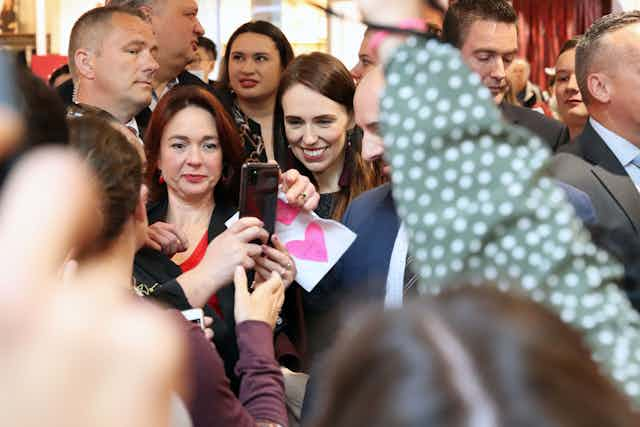Jacinda Ardern’s popularity has fluctuated over the past five years, with the prime minister’s approval peaking at 76% in May 2020. Those early rises in popularity were met with warnings about the risks of placing a political leader on a pedestal. Some even labelled the phenomenon of “Jacindamania” a personality cult or branded Ardern “a cult of personality politician”.
But this description not only misrepresents Ardern and her popularity – it also dilutes the concept of a “personality cult”, overlooking several of its defining characteristics.
My research explores the difference between mere popularity and personality cults. This work is important as commentators and media increasingly conflate the two ideas.
By definition, a personality cult parallels religious worship, elevating an individual’s authority “through the deliberate creation, projection and propagation of a godlike image”.
A personality cult also entails a specific set of social practices including inflated flattery and toadying, immunity from delegitimising crises and entrenched rituals.
In the contemporary context, the label of personality cult has been more accurately applied to leaders like Russian president Vladimir Putin and former US president Donald Trump.

Debunking the myth of the cult
While a personality cult can develop organically from the general population, it equally needs to be cultivated from above to be used as an instrument of power.
Over the past few years, artists have depicted Ardern as Wonder Woman and as pop cultural figures like Star Wars’ Princess Leia or Rosie the Riveter from WWII marketing imagery.
But there have been no official attempts from Ardern or the government to depict her as a hero – in stark contrast to how both Trump and Putin have contributed to their own glorification.
Trump, for example, photoshopped an image of his face on Rocky Balboa’s body and posted it on social media. The Russian government has released numerous official photos of Putin riding around bare-chested in the Siberian wilderness, cultivating an image of the leader as the ideal Russian man.
No shameless toadying
The most significant differences between Ardern’s popularity and a fully-fledged personality cult can, however, be found in how the public responds to exaggerated depictions of their leader.
Chechen leader Ramzan Kadyrov called Putin a hero “appointed by Allah” who everyone should bow down to. Former US Secretary of Energy Rick Perry compared Trump to biblical kings, calling him “the chosen one, sent by God to do great things”.
In contrast, the praise Ardern receives is less inflated and excessive.
And while some argue that Ardern’s halo has blinded her fans to deeper problems, her supporters are not completely blind to her mistakes and shortcomings, with marked fluctuations in approval polls that coincide with her political successes and failures.
Inflation, Omicron and a straining health system have all eroded support for Ardern and the Labour party. Unlike what would be expected with a personality cult, her popularity is not immune to strong political headwinds.
Absence of rituals
In terms of more traditional cult-like behaviour, a personality cult also entails a ritualistic element.
After Putin unexpectedly stopped in the village of Izborsk, his path through town was marked, along with the places he had bought cucumbers, drunk from the fountain, and touched a tree and made a wish.
Magnitogorsk Museum likewise exhibited the overalls he had worn during his visit. Visiting these locations have become a matter of pilgrimage for his followers.
Read more: What kind of person joins a cult or joins a terror group?
Such behaviour has been absent around the New Zealand prime minister.
Admittedly, Ardern’s weekly updates from her home during the COVID-19 lockdown in 2020, covering everything from serious political matters to her daughter’s nap time, could be reminiscent of a ritual, given it engaged people in an activity revolving around her.
However, the weekly updates didn’t originate at the grassroots level, unlike the hero worship of Putin, and their absence has been largely inconsequential for the community.
Read more: Vladimir Putin, the czar of macho politics, is threatened by gender and sexuality rights
Explaining ‘Jacindamania’
“Jacindamania” illustrates how popularity and a few hero-like depictions are not enough to constitute a fully-fledged personality cult.
That Ardern’s popularity hasn’t manifested itself into social practices and thus transformed into a personality cult, means that she has less authority than is suggested by some commentators.
Ardern can’t use her popularity to make her supporters follow orders blindly. Even loyal Labour voters challenge her political direction.
Trump, on the other hand, encouraged his supporters to unlawfully storm the Capitol in an attempt to overturn the 2020 presidential election results. Recent congressional hearings found these supporters rioted after being encouraged by Trump and stopped when Trump told them to go home.

Tall poppy syndrome could be a barrier
Calling the phenomenon surrounding Ardern a cult thus grossly overestimates the extent of her power – and clashes with New Zealand culture.
With their perception of the country as an egalitarian society and the prevalence of the so-called “tall poppy syndrome”, New Zealanders are arguably less predisposed to worship or elevate a single individual.
New Zealanders’ innate modesty and tendency to downplay achievement are not conducive to the cultivation of a cult from above – or below.
So, while Ardern has experienced waves of popularity both domestically and on the global stage, her support is far from entering the territory of the personality cults surrounding Putin or Trump. She is popular, sometimes, but not infallible.

